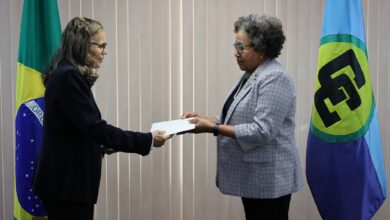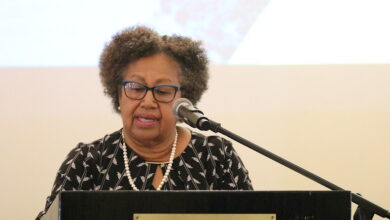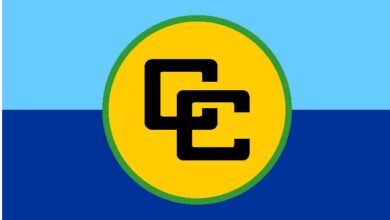The Special Meeting of the Conference of Heads of Government called to discuss the report of the West Indian Commission and the Common External Tariff, was held in Port-of-Spain, Trinidad and Tobago during the period 28 – 31 October 1992.
The Heads of Government in attendance were:
Hon. Hubert Ingraham, Prime Minister and Minister of Finance and Planning, The Bahamas; the Rt. Hon. Erskine Sandiford, Prime Minister and Minister of Finance and Economic Affairs, Barbados; the Rt. Hon. George Price, Prime Minister and Minister of Finance, Home Affairs and Defence and Trade and Industry, Belize; Hon. Dame Mary Eugenia Charles, Prime Minister and Minister of Finance, Dominica; the Rt. Hon. Nicholas Braithwaite, Prime Minister and Minister of Finance, Home Affairs and External Affairs, Grenada; His Excellency Dr. Cheddie Jagan, President of the Co-operative Republic of Guyana; Hon. Percival J. Patterson, Prime Minister of Jamaica; Hon. Reuben Meade, Chief Minister of Montserrat; Dr. the Rt. Hon. Kennedy Simmonds, Prime Minister and Minister of Foreign Affairs, Home Affairs and Finance, St. Kitts and Nevis; the Rt. Hon. John Compton, Prime Minister and Minister of Finance, Saint Lucia; the Rt. Hon. James Mitchell, Prime Minister and Minister of Finance, St. Vincent and the Grenadines; Hon. Patrick Manning, Prime Minister of Trinidad and Tobago.
Antigua and Barbuda was represented by Hon. Lester Bird, Deputy Prime Minister, and Minister of Foreign Affairs.
Mr. Edwin Carrington, Secretary-General of the Caribbean Community chaired the Opening Ceremony.
Hon. Patrick Manning, Prime Minister, Trinidad and Tobago, in delivering the Opening Address, reminded the Meeting of its purpose. He stressed that progress towards the goal of regional integration was incremental as well as evident. He urged the Region to celebrate its triumphs, but at the same time to be cognisant of the limited progress achieved in certain vital areas. He suggested that compromise and conciliation be the twin themes of the Meeting.
Statements were also delivered by Hon. Hubert Ingraham, Prime Minister of The Bahamas, and H.E. Dr. Cheddie Jagan, President of the Co-operative Republic of Guyana.
The Chairman of the West Indian Commission, Sir Shridath Ramphal, also presented the Report of the Commission – “Time for Action”.
The current Chairman of the Conference, Hon. Patrick Manning, presided over the Meeting.
The Heads of Government warmly welcomed Prime Minister Ingraham of The Bahamas and President Jagan of the Co-operative Republic of Guyana to the Conference following their recent election to high office in their respective countries. The Heads of Government also expressed their pleasure at the honouring of a CARICOM national and holder of the Order of the Caribbean Community Hon. Derek Walcott with the award of the Nobel Prize for Literature. They recognised that the work of Derek Walcott demonstrated the capability of the people of the Region and served as a source of inspiration.
The Heads of Government expressed their profound sorrow at the passing of Dr. Arthur Wint, the first Caribbean Olympic Gold Medallist, earlier this month. They also conveyed their sincerest condolences to the bereaved family.
The Heads of Government expressed appreciation to the Government and people of Trinidad and Tobago for the excellent arrangements which ensured the success of the Meeting. They also commended the CARICOM Secretariat for its outstanding contribution to the Conference.
THE WEST INDIAN COMMISSION REPORT – TIME FOR ACTION
The Heads of Government noted that the West Indian Commission (WIC), in its Report “Time for Action”, had produced one of the seminal works of its kind in West Indian history. On behalf of the people of the Region, they extended appreciation and gratitude to the Chairman and Members of the Commission for the exemplary manner in which it discharges its mandate.
The Heads of Government recalled that the decision to establish the West Indian Commission was taken in July 1989 at their Tenth Meeting, amidst tremendous fears that the Caribbean, against the background of the rapid changes and developments taking place in the international environment, could be in danger of becoming marginalized.
The Heads of Government, having studied the various recommendations of the Report, accepted the challenge that it was indeed “time for action”. They agreed that the aim must be to pursue initiatives, conclude agreement, and strengthen institutions of implementation with a sense of urgency so that, by the end of the decade of the 1990’s, the West Indies would be a more closely integrated Community of sovereign states. This would necessarily involve the revision of the Treaty of Chaguaramas. In this regard, the Heads of Government agreed to a broad range of actions aimed at achieving this objective.
INSTITUTIONAL STRUCTURE AND IMPLEMENTATION PROCESS OF THE COMMUNITY
A Bureau of Heads of Government
The Heads of Government accepted that there was need to strengthen the Community’s institutional structure and implementation process. They recognised that in order to be effective, the machinery established must have political authority. With this in mind, they agreed to establish a Bureau comprising the current Chairman of the Conference the outgoing and incoming Chairmen of the Conference, as well as the Secretary-General acting in the capacity of Chief Executive Officer. The Chairmanship would rotate on a six monthly basis. The Bureau would have competence to initiate proposals, update consensus, mobilise action and secure the implementation of CARICOM decisions in an informed and expeditions manner.
The Heads of Government also agreed that this system would be put in place 1 January 1993.
The CARICOM Secretariat
The Heads of Government also agreed that the CARICOM Secretariat would be strengthened through vesting the Secretary-General, by provisions in the Treaty, with the appropriate executive authority needed to carry out his tasks. They requested him to prepare proposals for the restructuring of the Secretariat, which would aim at providing the Secretariat with appropriate skills needed for both deepening and widening the integration process. These proposals would be presented for the consideration of the Heads of Government at their Fourth Inter-Sessional Meeting.
The Council of Ministers
The Heads of Government agreed that to further enhance the capacity of the Member States to implement decisions of the Community, there should be designated in each Member State, a Minister responsible for CARICOM Affairs. They further agreed that these Ministers would constitute a Caribbean Community Council of Ministers, which would eventually replace the Common Market Council of Ministers as the second highest Organ of the Community.
Joint Overseas Representation
The Heads of Government, recognising the limitations of the Region’s financial and human resources, agreed that, with immediate effect, CARICOM Governments, wherever feasible, should implement in a rational, effective and orderly way, a programme of joint overseas representation.
They accepted that there should be increased co-operation among the overseas missions. They further agreed to the sharing of facilities, where feasible, in capitals where there are several missions and to the representation by Member States of each other’s interests in capitals where only some Member States were represented.
The Assembly of Caribbean Community Parliamentarians
The Heads of Government reaffirmed their commitment to the decision taken in 1990 for the establishment of an Assembly of Caribbean Community Parliamentarians. They urged early signature and ratification of the Agreement.
CARICOM Charter of Civil Society
The Heads of Government agreed to the development of a CARICOM Charter of Civil Society to govern such matters such as a free press, a fair and open democratic process, the effective functioning of the parliamentary system, morality in public affairs, respect for fundamental civil, political, economic, social and cultural rights, the rights of women and children, respect for religious diversity, and greater accountability and transparency in governance.
A CARICOM Court
The Heads of Government noted that progress had already been made towards the establishment of a Caribbean Court of Appeal as the final appellate court for appeals from the courts of Member States. The Heads of Government considered the question of a CARICOM Court vested with original jurisdiction in matters arising under the revised Treaty of Chaguaramas, including authority to issue orders facilitating compliance with CARICOM decisions. They agreed that this matter of the original jurisdiction of the CARICOM Court required further study, with a view to determining a position on it at their next Regular Meeting.
COLLECTIVE APPROACHES
The Heads of Government endorsed the recommendation of the West Indian Commission of the West Indian Commission that a collective approach be adopted in response to current and potential changes in the international community, including international political and financial institutions. They recalled that such approaches were taken in regard to Lomé, the Caribbean Basin Initiative and the Enterprise for the Americas Initiative.
ASSOCIATION OF CARIBBEAN STATES
The Heads of Government agreed to enter into consultation with other Caribbean States, Central American States and other Latin American countries of the Caribbean littoral, with the objective of establishing an Association of Caribbean States, as envisaged in the Report of the West Indian Commission. The Heads of Government were of the view that such an initiative would indicate the strong desire on the part of CARICOM States to enter into more meaningful relations with those countries.
THE WIDER WORLD
The Heads of Government agreed that in addition to strengthening relations with countries within the Region, the Region should continue to strengthen relations with those countries of the wider world, with which it has had traditional links and agreements.
COMMON EXTERNAL TARIFF
The Heads of Government approached the revision of the Common External Tariff of the Common Market in the context of the current trends towards globalisation of the international economy, the ongoing transformation of regional and wider hemispheric trading systems and the deepening of regional economic integration arrangements.
In this regard, they were aware of the need to safeguard sensitive sectors in the Region, particularly the agriculture sector, in which regional production competes with imports which benefit from subsidies and other governmental supports. The Heads of Government were also aware of the discussions currently in progress at the international level towards the gradual reduction of such supports.
The Heads of Government recognised the urgent need to fashion appropriate responses to these developments, in order to improve the efficiency and competitiveness of their productive sectors. They agreed to implement a phased reduction of the CET rates with the objective of achieving a rate structure of five to twenty per cent by 1 January 1998. In accordance with the Treaty of Chaguaramas, special provisions have been made for the LDCs.
The Heads of Government also recognised the need to implement other supporting policy measures, including the development of related Origin Rules, Incentive Regimes, anti-dumping and countervailing duties legislation, a Common Trade Policy and arrangements to facilitate Production Integration.
Additionally, the Heads of Government recognised the critical need to secure resources to increase efficiency in the productive sectors of all Member States.
CARIBBEAN INVESTMENT FUND
The Heads of Government were brought up to date by the Hon. Prime Minister of Jamaica on the progress made towards establishing the Caribbean Investment Fund.
DEVELOPMENT IN HAITI
The Chairman updated his colleague Heads of Government on initiatives being taken to seek to resolve the political situation in Haiti. They expressed support for these initiatives.
DECLARATION ON SHIPMENTS OF PLUTONIUM
The Heads of Government agreed to issue a Declaration on Shipments of Plutonium.
THE 1992 PROTOCOL OF PORT-OF-SPAIN
The Heads of Government agreed to issue the 1992 Protocol of Port-of-Spain.
THE WEST INDIES CRICKET TOUR OF AUSTRALIA
The Heads of Government extended support and best wishes to the West Indies Cricket Team for a winning tour to Australia.
Port-of-Spain, Trinidad and Tobago






